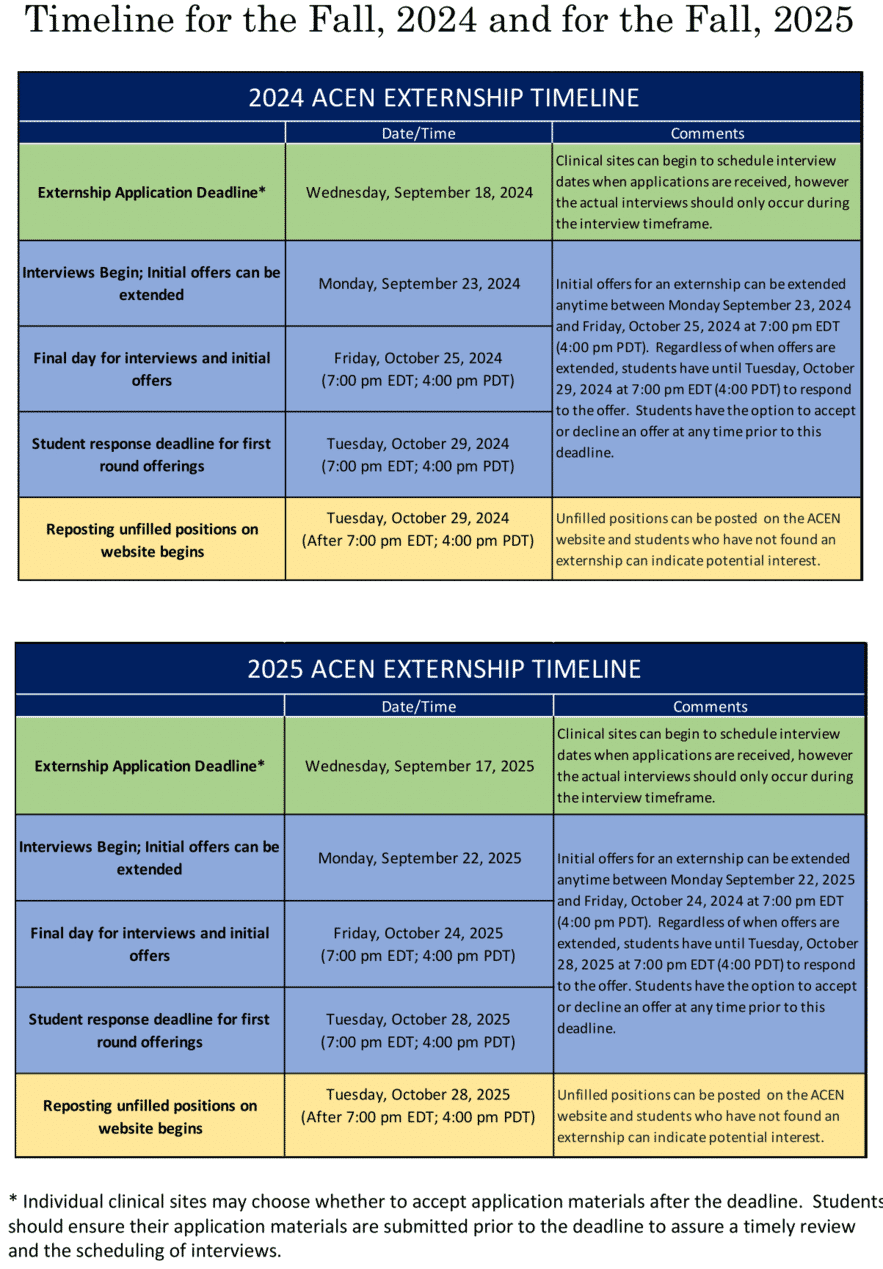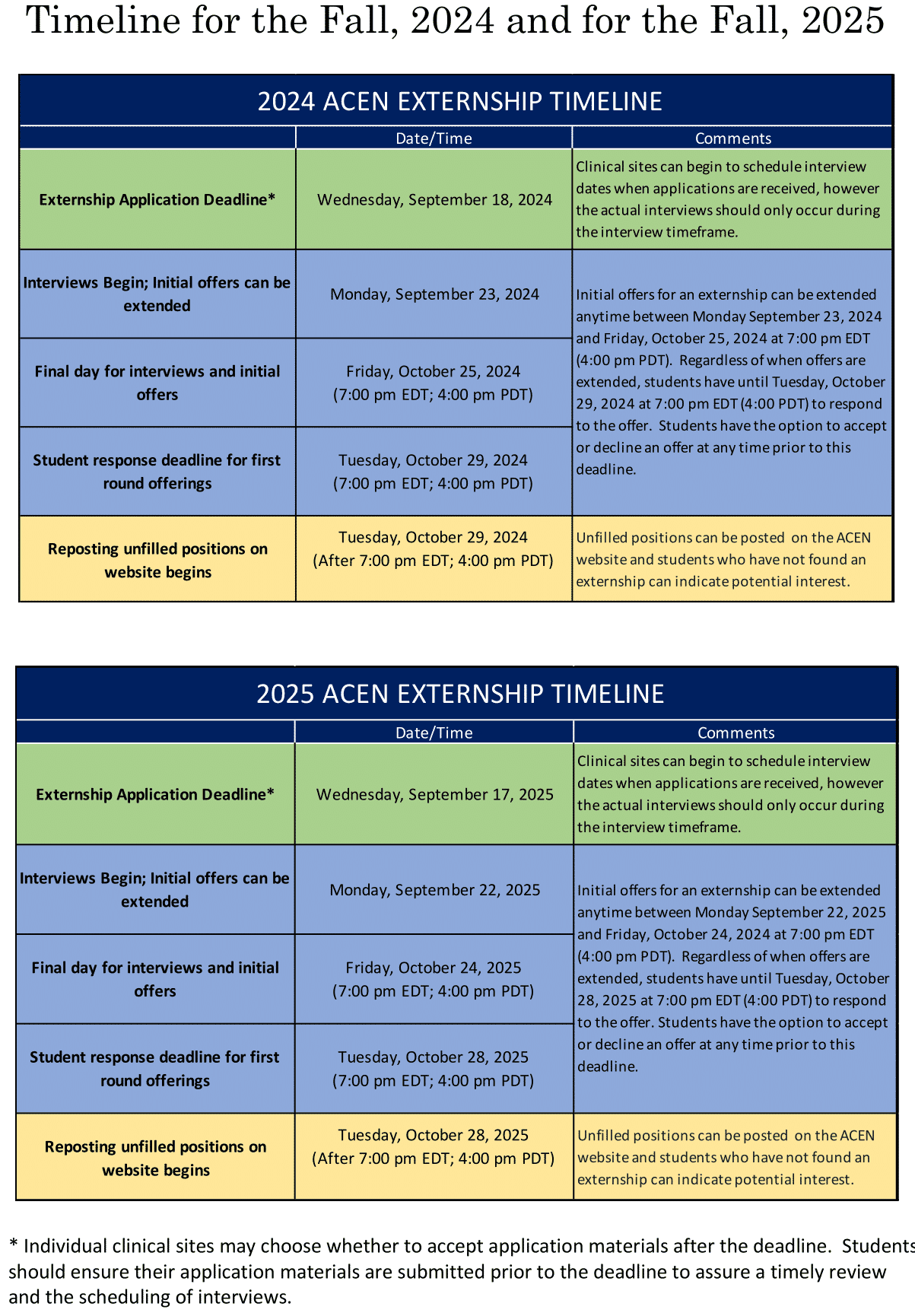
As of January 2024, the ACEN is comprised of more than 120 clinical sites representing more than 250 externships, ranging from private audiologic practices to hospitals to major medical centers.
The ACEN was organized by audiology practices and institutions with the goals of:
- (1) standardizing elements of audiology student’s final-year externship process and
- (2) sharing best clinical educational practices across sites to further improve student outcomes.
Participation in the ACEN is entirely voluntary with decisions regarding initiatives made by representatives of the participating clinics. The clinical sites that participate in the ACEN recognize the opportunity to contribute to the educational mission of the profession while at the same time improving the process for the externship.
The ACEN was formed with the input and cooperation of academic programs. Since the inception of ACEN, representatives of academic programs have provided advice and counsel regarding the impact of externship standardization on the academic process in general and students specifically. With respect to the goal of standardizing the externship process, the ACEN is focused on those elements that are within the purview of the clinical sites proper. The ACEN recognizes and respects the role of the academic programs as the primary entities responsible for assuring students comply with their program’s requirements for the externship experience and, subsequently, for graduation. The ACEN is committed to a continuing partnership with academic programs to make further improvements in the externship process.
ORIGIN AND PURPOSE OF THE TIMELINE
Clinical sites voluntarily provide externships as part of their continued contributions to the training of the next generation of professionals. There is a universal recognition that the externship is a substantive portion of the clinical training of the audiology student, and thus clinical sites have an obligation to provide the necessary experiences, supervision and mentoring for the student to attain entry-level competencies for the profession. Students generally choose an externship that will assist them in attaining these competencies, while at the same time allowing them to gain experience in a clinical environment that may be of interest to them.
The decision to offer an externship, and a subsequent acceptance of that offer, is often tied to this ability to meet the needs and interests of the student, while at the same time taking advantage of the expertise of the clinicians at that site. For example, a student with an interest in pediatrics would be more likely to apply to a children’s hospital, and the staff at a children’s hospital would likely be more interested in students that have an interest in pediatrics. Academic programs have an interest in the placement of students to assure that they meet accreditation standards and that students receive appropriate clinical experiences. Thus, the decision to offer an externship, and its subsequent acceptance, is often based on fulfilling the mutual interests of all stakeholders: the student, the academic program and clinical site.
One of the most common concerns of externship sites, academic institutions, and students was the timing associated with the application, interview, and offer and acceptance process of the externship. Prior to forming the ACEN, each clinical site would set their own schedule for application deadlines, interviews and offering and acceptance of externship position(s), which negatively impacted each of the stakeholders. Academic programs had to continually monitor the deadlines of these externship features across a multitude of sites, students were often forced to make decisions regarding the acceptance of an externship before they had finished interviewing, and externship sites were continually shifting their deadlines to be competitive. To this end, members of the ACEN determined that standardization of this timeline would be beneficial for all stakeholders. The purpose of the timeline is to increase the efficiency of the process by reducing the competition among the clinical sites, allow students to make informed decisions, and reducing the burden on academic programs to manage the process.
Students often reported undue pressure to accept the first externship offer that they might receive, in part to assure themselves of an externship site, and, in part, due to the fear of not having other options. The ACEN timeline is specifically designed to relieve this pressure on the student by allowing them time to interview across multiple sites and to make informed decisions about their choice of an externship. In addition, clinical sites know that students do not have to make quick decisions and therefore do not have to conduct earlier interviews or make rushed decisions about which candidates should receive an offer of an externship.
FORM AND FORMAT OF THE ACEN TIMELINE
The ACEN Common Timeline provides specific dates for students to submit their application materials, the date interval for interviews (either on-site or virtual), the timeframe for making offers of an externship, and the date by which students need to respond to those offers. The Common Timeline has evolved over time as both formal and informal feedback was received from students, academic programs, and clinical sites. The dates selected for each step in the process allow the academic programs and students time to provide necessary information and materials for the application process, for the clinical sites to accept and review applications, sufficient time for interviews to be scheduled, time for decisions regarding the offering and acceptance of externships, and for academic programs to execute affiliation agreements prior to the start of the externship year. The ACEN expects that the timeline will continue to evolve as additional feedback is received, or as additional circumstances warrant.
In general, the timeline requires that students submit their applications by mid-September, with any required interviews with clinical sites commencing the following week. The interview period is approximately five weeks. Offers for the externship can begin at any time in the interview period, however students will have approximately five to six weeks after the start of the interview period to make their decisions about accepting or declining any offers. For clinical sites that have unfilled positions after the deadline for acceptance passes, they can begin re-posting positions. The 2024 Common Timeline is shown in the example below. (Note: the specific dates vary from year to year.)
For 2024, students and academic programs should submit all required application materials prior to September 18, 2024.
The required application materials may vary from site to site, so it is incumbent on the students and academic programs to assure the correct materials are submitted to each site. Individual clinical sites may choose whether to accept application materials after the deadline. Students are strongly encouraged to ensure their application materials are submitted prior to the deadline to assure their chances for a timely review and scheduling of interviews. Clinical sites may begin to the scheduling of interviews after receiving completed applications, or they may choose to wait until all applications are received before scheduling interviews. Whether virtual or on-site, the interview period for the 2024 cycle runs for five weeks, beginning Monday, September 25, 2024 through Friday, October 25, 2024.
Clinical sites in the ACEN may begin offering externships at any time after the interview period begins. A clinical site that identifies a compatible student may make an offer to that student at any time. Importantly, the student does not need to respond to the offer until the deadline of Tuesday, October 29, 2024 at 7:00 pm Eastern. The student may choose to accept the offer prior to the deadline, but they also have the option to wait until they have completed all their interviews. Should they choose to accept the offer, the student should inform any other sites they may have applied to of their decision. Similarly, if they choose to decline the offer, they should inform the offering site as soon as possible.
For clinical sites that do not fill an externship position, they can begin posting the openings on the ACEN website immediately following the decision deadline. Students who did not find an externship can review the openings, and through their academic programs, should contact those sites to determine the course of action for applying and/or interviewing.
The clinical externship sites that participate with the ACEN voluntarily agree to follow the common timeline for the application, interview, and offer and acceptance process. Standardizing the externship requires that all stakeholders engage in the process with an understanding of the expectations necessary to achieve success. Thus, the following guidance was developed to provide clinical sites, students, and academic programs with further understanding of the expectations for engagement with the Common Timeline.
GUIDANCE FOR ENGAGEMENT WITH THE COMMON TIMELINE
1. Introduction to the ACEN Common Timeline for the Externship
- 1.1. The Common Timeline is sponsored by the participating practices, clinics, and institutions of the Audiology Clinical Education Network, an organization founded for the purpose of promoting standardized processes for the audiology externship experience across the U.S.
- 1.2. The Common Timeline provides an equitable system for submitting applications, conducting interviews, and extending and accepting offers for externships. It provides a process by which academic programs, students and externship sites can make informed decisions about an externship.
- 1.3. Clinical sites are not required to provide externship opportunities but do so as part of a responsibility to the educational foundation of the profession.
- 1.4. The common timeline was developed to standardize this portion of the externship process and was designed to reduce the stress and burden on the students, academic programs, and externship sites.
- 1.5. There is the expectation that all participants in the Common Timeline agree to follow the guidance outlined in this document.
2. General requirements for all parties
- 2.1. All students, academic programs and clinical sites are expected to act in an ethical and professionally responsible manner. This includes the responsibility to honor commitments to the externship timeline and process, offers of an externship and acceptance of those offers.
- 2.2. The ACEN is not a matching program and does not place students in externship sites.
- 2.2.1. The ACEN does not oversee or conduct services relative to the application, interviews, or decision processes for clinical sites associated with the timeline.
- 2.2.2. The ACEN assumes no responsibility for students who do not find a placement in an externship site that is part of the network.
- 2.3. The common timeline does not address the starting and ending dates for the externship. Those dates are set by the individual externship sites in collaboration with academic programs, where applicable.
3. Academic programs
- 3.1. Academic programs have the responsibility for determining eligibility of students to participate in an externship and for communicating those requirements to the student.
- 3.2. Some externship sites may have additional eligibility requirements. It is the responsibility of the academic program to identify and comply with those requirements in the time frame specified by the clinical site.
- 3.3. Formal communications with the externship sites are the responsibility of the academic programs.
- 3.3.1. Academic programs are responsible for vetting externship sites to assure the services provided are consistent with the requirements for accreditation and graduation.
- 3.3.2. Communications regarding legal, educational, assessment, graduation, or other requirements for the externship resides with the academic programs.
- 3.3.3. The Faculty/Academic Externship Coordinator should expect to be copied on interview invitations and externship offers. It is expected that the coordinator or designated faculty will assist the student with making a timely decision of acceptance or rejection of offers and support the student in communicating their decision to the externship sites as quickly as possible.
4. Students
- 4.1. Students must be on track to meet the necessary academic requirements for entry into an externship as determined by their academic programs.
- 4.2. Some externship sites may have additional eligibility requirements. It is the responsibility of the student to identify any additional requirements, through their academic programs, and assure compliance with those requirements in the time frame specified by the clinical site.
- 4.3. Students should defer all formal communications with an externship site to their academic programs.
- 4.4. Students have the right to be free of undue pressure or persuasion to make decisions about an externship outside of the timeline.
- 4.5. Within the boundaries and processes established by their academic program, students have the right to (1) freely investigate any externship site, (2) keep confidential any information pertaining to an externship site and communication with an externship site, and (3) keep confidential the details of offers from externship sites.
- 4.6. Students must respond with their intentions to accept or decline an offer of an externship within the designated time frame, or sooner if possible.
- 4.7. Once an offer of an externship has been accepted, the student should inform other sites where an application has been placed of their decision. The student is not required to provide detail regarding any offers extended, criteria for deciding, the location or practice name, or other pertinent information about their decision.
- 4.8. Once a student is offered and accepts an externship placement, the student should honor that commitment. In the event of undue hardship (e.g., medical emergency, delayed graduation, etc.) or ineligibility (e.g., failure to meet academic or clinical site requirements) the student, through their academic program, should contact the clinical site to determine options for withdrawing or altering the externship. The student should coordinate all communication through their academic program.
5. Clinical Sites
- 5.1. Clinical sites must adhere to the timeline for applications, interview timeframes, extending offers of an externship, and expecting responses from students. Members of the ACEN network should not make offers earlier than the dates noted on the common timeline.
- 5.2. If a clinical site has additional externship requirements, it is the responsibility of that site to communicate those requirements to the students and academic programs prior to making offers.
- 5.3. Clinical sites cannot request students reveal any significant information regarding their applications to other externship sites, or their preferences, or the status of offers from other clinical sites.
- 5.4. The faculty/academic externship coordinator should be informed when interviews are scheduled with students and, subsequently, when offers of an externship are extended.
- 5.5. Sites should inform students who are not under consideration for an externship position at the earliest possible time.
- 5.6. Clinical sites should honor the educational nature of the externship, keeping in mind that the externship is one-fourth or one-third of a student’s education, that the externship happens in partnership with the academic institution and that an externship position should not be filling a staffing need in a practice.
- 5.7. Externships are educational experiences and should not be designed to meet the needs of the practice in leu of hiring a needed, licensed audiologist. Clinical sites should operate in a manner that no material impact on day-to-day operations would be experienced should an externship slot not be filled.
(Version 4.0)
Bygone Dates, for history's sake:

Interviews can be held. After an interview, offers can be delivered.
Students are not required to respond to any offers prior to Tuesday, October 24, 2023 at 7 pm EST.
Students can choose to respond at an earlier date/time.
If the student accepts any offer, the student needs to withdraw all other applications.
All institutions in the Network have voluntarily agreed to adhere to the following timeline:
- Application Deadline: Friday, September 22, 2023
- Interviews Begin: Monday, September 25, 2023
- Interviews complete: Friday, October 20, 2023
- Offers extended beginning: Monday, September 25, 2023 and Monday, October 23, 2023 (11 am Eastern; 8 am Pacific) Students can not be required to respond prior to Tuesday, October 24, 2023 at 7 pm EST (offer stands until October 24, 2023, 7 pm EST). Students can choose to respond at an earlier date/time. If the student accepts they need to withdraw all other applications.
- Response Deadline: Tuesday, October 24, 2023 (7 pm Eastern; 4 pm Pacific)
- Subsequent Offers Begin: Tuesday, October 24, 2023 (7 pm Eastern; 4 pm Pacific)
- Reposting unfilled positions: Tuesday October 24, 2023 (7 pm Eastern; 4 pm Pacific)
- The timeline does not address the timing for the externship itself, but rather focuses on the process of application, interviews, offers, and acceptance of offers.

